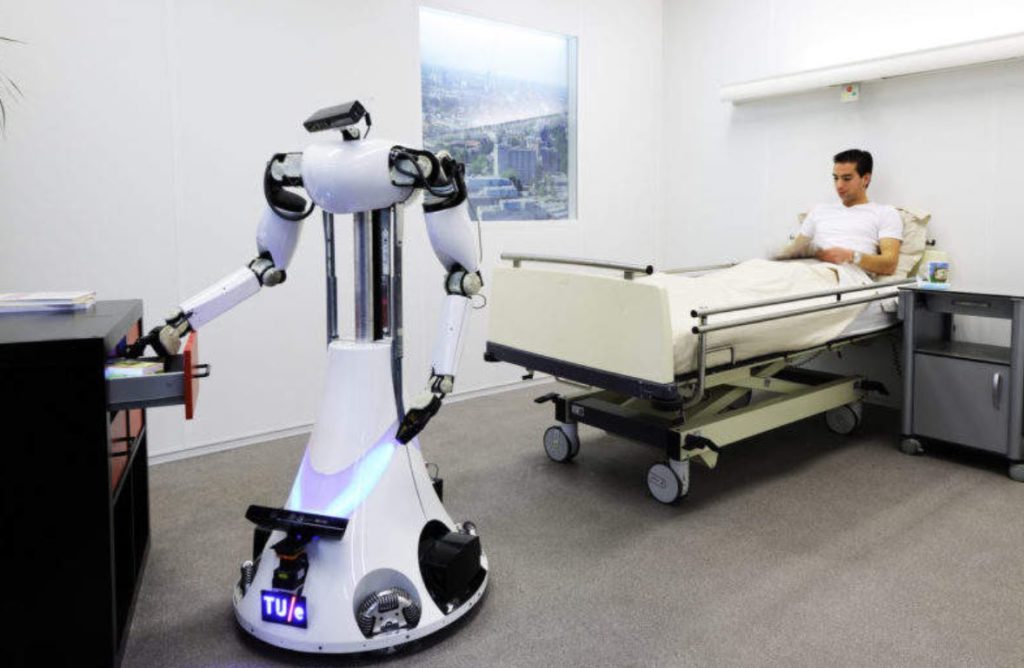 By Aaron Kesel
By Aaron Kesel
Robots are now also taking over healthcare jobs worldwide as its safer for a droid to help disinfect a hospital or help a covid patient than a human who risks getting infected by the still yet mysterious virus.
Virus-zapping robots are being used in the fight against CV in various areas around the world.
One such bot is a five-and-a-half-foot droid that will buzz around hospitals like R2-D2 and destroy killer virus bacteria using a UV-C light. The battery-powered bots will roam corridors and emit their UV-C light that will work to eradicate germs in a short time period.
Makers of one such bot, the Ultra-Violet Disinfection (UVD) robot say their machines “eliminate pathogens in 10-15 minutes.” The robots also use flashing lights to signify which stage of the disinfection process they are in.
Hospitals in Derby and Burton are the latest across the globe to bring disinfectant robots to the frontline against the virus, Derby Telegraph reported. Other health centers in Nice and Boston are also purchasing bots to use for combating CV.
Standing at five-and-a-half-feet tall, the automatic cleaners have wheels on the bottom that allow them to roam corridors and patient rooms.
NHS nurses say the tech will be vital in the fight against CV, which has caused one of the worst pandemics in recent years.
Helen Forrest, Infection Prevention and Control Lead Nurse, said:
We’re really pleased and excited to have these new UVD Robots available at our Trust.
This state-of-the-art technology will allow us to enhance our excellent, existing environmental cleaning service, and keep our hospitals safe for our patients, including those who are most vulnerable.
This is a tried and tested technology in environmental disinfection and will enable us to keep key clinical areas, such as Theatres, well disinfected and safe for our patients.
Danish makers, UVD Robots, say their free-moving germs killers can wipe out 99.9 percent of bacteria in under 10 minutes.
Dan Harding, managing director of Sychem, UK Distributor for UVD Robots, added:
UV Disinfection is a proven means of disinfecting areas and destroying microorganisms.
It offers a very innovative method of disinfecting and decontaminating an area, by using high doses of UV-C light. The UVD Robot is exceptional in its performance and is completely autonomous, which is really cutting edge in the world of interrupting key transmission pathways in healthcare.
Here are 9 other types of robots being used for disinfecting due to the pandemic. Now This has a video of one of these robots disinfecting hospitals in Italy. Elsewhere in Boston it has been reported that Boston Dynamics’ robot dog Spot is also being used in a hospital to help with coronavirus treatment.
Robots are also being used in Europe for automating Covid testing processes in hospitals. The robot, called flowbot ONE, significantly reduces the time it takes for laboratories to produce results for patients to tell them whether they are infected with Covid-19, News-Medical.net reported.
Last year, robots took a record number of jobs in the U.S. according to Robotic Industries Association (RIA) as Activist Post reported. Now, with the impetus of the coronavirus the number of jobs occupied by robots could multiply quite rapidly. Oxford Economics also published its own report warning that accelerating technological advances in automation, engineering, energy storage, artificial intelligence, and machine learning have the potential to reshape the world in 2020 through 2030s, displacing at least 20 million workers.
With the coronavirus as a catalyst to speed up the deployment of automated machines, we can probably safely say that number will be much more severe. It seems I am not the only one to share that opinion; a recent MarketWatch article written by Johannes Moenius, a professor of global business and the director of the Institute for Spatial Economic Analysis at the University of Redlands, agrees with this author’s conclusion stating “at least 50 million jobs could be automated in just essential industries.”
In fact, the Brookings Institution said in a report last month that “any coronavirus-related recession is likely to bring about a spike in labor-replacing automation … Automation happens in bursts, concentrated especially in bad times such as in the wake of economic shocks, when humans become relatively more expensive as firms’ revenues rapidly decline.”
**By [@An0nkn0wledge](https://hive.blog/@an0nkn0wledge)**
Aaron Kesel writes for Activist Post.
Image: El Mundo
Subscribe to Activist Post for truth, peace, and freedom news. Send resources to the front lines of peace and freedom HERE! Follow us on SoMee, HIVE, Parler, Flote, Minds, and Twitter.
Provide, Protect and Profit from what’s coming! Get a free issue of Counter Markets today.